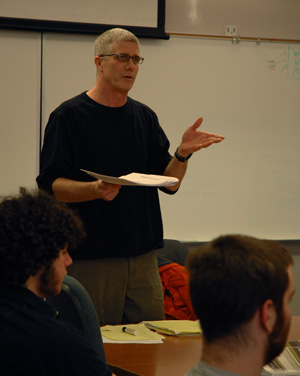Tom Kerr leaned back in his office chair and listened to the recording of a poem from his faculty Web site one afternoon in January. A long-limbed, silver-haired man whose lined mouth is quick to smile, Kerr said he was disturbed and saddened by the poem’s unpolished verse.

“It’s intense,” said the assistant professor of writing. “There’s a rough quality I want to preserve, not smooth over.”
But the voice coming from Kerr’s computer was not his own. It belonged to Steve Champion, a 47-year-old former gang member incarcerated on death row at San Quentin State Prison in San Quentin, Calif. Kerr has helped Champion revise and prepare his memoirs for the past four years. One publisher contacted Kerr to express interest in an account of Champion’s life prior to his incarceration, Kerr said, which he and Champion are in the process of writing.
Kerr’s relationship with Champion began in 2003, when Kerr taught a senior seminar at Ithaca College on the U.S. prison system, which required communication with inmates across the country. Champion was among the 40 prisoners who responded to Kerr’s request. He sent essays with his letter to Kerr and asked for the professor’s help in compiling a book.
Kerr flew to California the following summer to meet Champion in San Quentin. Kerr agreed to help create his memoirs, a collection detailing Champion’s double homicide conviction and the 25 years he has served in prison. Champion does not discuss the crime for which he was convicted in his essays, reflecting instead on his life in prison.
“We connected,” Kerr said. “He trusted me.”
Last year, Kerr won the Rachel Cory Award at the Conference on College Composition and Communication for his work on the memoirs. The award is given by Long Island University for those who take professional risks to fight for justice.
Kerr, who has taught at the college since 2001 and received tenure last week, has also carried his project with Champion into the classroom. He said two of his students, Emily Paulsen ’05 and junior Elizabeth Muse, helped edit Champion’s poems and essays, and sometimes helped transcribe them from recordings Champion made over the phone.
Muse, a writing major who transcribed Champion’s essay “Becoming a Writer in Prison” from a recording Champion made over the phone, said Champion’s writing made her more aware of the prison system.
“Here is a man who has [committed], or at least has been convicted of, heinous crimes … but he writes beautifully,” she said. “These men and women should be able to show their work and Tom [Kerr] is helping them have a voice.”
Kerr said he has spent the last six months searching for an agent willing to publish Champion’s writing. He said some publishers want Champion’s essays rewritten, while others are hesitant to manage the project because of the public’s potential reaction to a prisoner portrayed with sympathy.
Though Kerr acknowledges many projects like this are ghostwritten, he said it was not how he wanted to approach Champion’s writing.
“If I rewrite it, where’s his voice?” Kerr said. “What’s the point?”
Kerr said he knows not everyone wants to hear Champion’s story, and said he posts the hate mail he receives about the project on his office door. The letters criticize Kerr for sympathizing with a death row inmate and supporting abolishment of capital punishment,he said.
Fred Wilcox, associate professor of writing, said Kerr’s work sends a valuable message about prisoner reformation.
“Tom is trying to show it’s possible for people to be rehabilitated,”he said. “If [Champion] can do that, if people can be rehabilitated, it should be very inspiring.”
Kerr said he values his work and his relationship with Champion.
“We’ve been good friends,” he said. “He relies on me to keep hope alive.”







